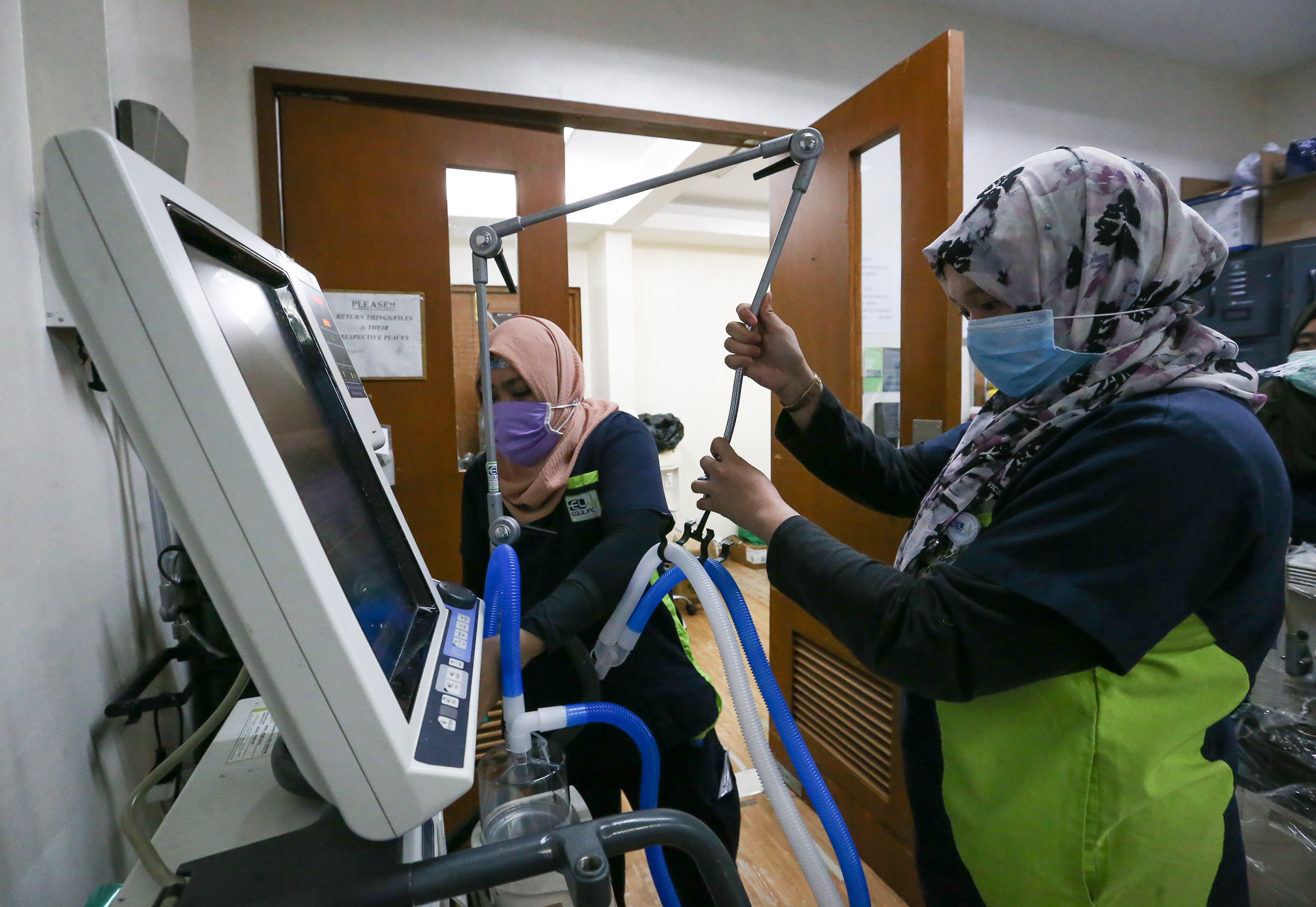500 Pinoy patients joining int’l trial for coronavirus drug

CHALLENGING TIMES FOR PGH Two respiratory therapists set up a mechanical ventilator for COVID-19 patients at the critical care unit of the Philippine General Hospital on Thursday. The government-run hospital is currently trying the convalescent plasma therapy to treat the disease. —LYN RILLON
Five hundred Filipino COVID-19 patients will join an international trial of possible drugs for the disease caused by the new coronavirus, the Department of Health (DOH) said on Thursday.
Health Undersecretary Maria Rosario Vergeire said the clinical trial in the Philippines would be held in at least 20 hospitals across the country. It could start as early as Friday, she said.
Four drugs
The “solidarity trial” is a study of the safety and effectiveness of four possible drugs for COVID-19—remdesivir, under research for the treatment of other coronaviruses; the anti-HIV lopinavir or ritonavir or the combination of these two; interferon; and the antimalarial chloroquine.
Vergeire said more than 90 countries were taking part in the trial and that the number of participating patients and the trial period could be expanded later.
There is no cure for COVID-19 at present.
Article continues after this advertisementPresident Duterte has offered a reward of P10 million for any Filipino scientist who could develop a vaccine for the disease.
Article continues after this advertisementDeveloping a vaccine is a tedious process and requires comprehensive research, Vergeire said. “There are many small clinical trials in different countries but these are not at all conclusive. They are all experimental,” she said.
Plasma therapy
The Philippine General Hospital (PGH) is trying convalescent plasma therapy to treat the disease. On Wednesday, the hospital said its patients who had been given plasma from recovered COVID-19 patients had been showing improvement.
On Thursday, the PGH renewed its call for plasma donations from recovered COVID-19 patients.
“We are calling for plasma donations from COVID-19 survivors. Their antibodies may help save patients who are still battling the disease, especially the severe and critical cases,” said Dr. Jonas del Rosario, the PGH spokesperson.
On Thursday, the DOH reported 16 new coronavirus deaths and 271 new confirmed infections.
In its latest bulletin, the department said 16 patients had died, raising the toll to 462, and the additional infections brought the total to 6,981. It said 29 patients had recovered, pushing the number of survivors to 722.
Vergeire said it was still too early to say whether the spread of the coronavirus in the country was slowing to a manageable level.
She said the case doubling of coronavirus infection had slowed to five days from three.
“That’s a good indication because it means the rise in the number of cases is not fast,” Vergeire said.
But the daily DOH report is not real-time, she said, because of a gap in the “turnaround time,” which she did not explain.
The situation could be worsened by the arrival of thousands of Filipino migrant workers who have lost their jobs in lockdowns in other countries with coronavirus infections. (See related story in Regions, Page A8.)Nearly 18,000 migrant workers are coming home in the coming days, according to the Department of Foreign Affairs (DFA), which is leading the repatriation of Filipinos who have been temporarily laid off their foreign jobs due to shutdowns forced by the coronavirus pandemic.
Quarantine
The DFA is appealing to returning migrants to observe quarantine measures to avoid worsening the local outbreak.
Returning migrants are required to be quarantined for 14 days in DOH isolation centers before they can be allowed to reunite with their families.
Answering questions about the high rate of infection among health-care workers, Vergeire said the problem was not mainly due to the lack of personal protective equipment but might also be the result of long working hours and patients’ withholding of complete information.
“For health-care workers, that’s a given. The risk that they take is really high. Even in other countries, a certain percentage of their COVID-19 [patients] is really health-care workers. They are really at risk of getting the disease because they care for [the] patients,” Vergeire said. —WITH A REPORT FROM DONA Z. PAZZIBUGAN